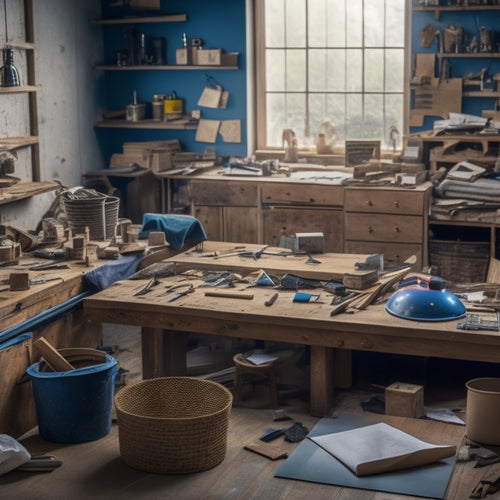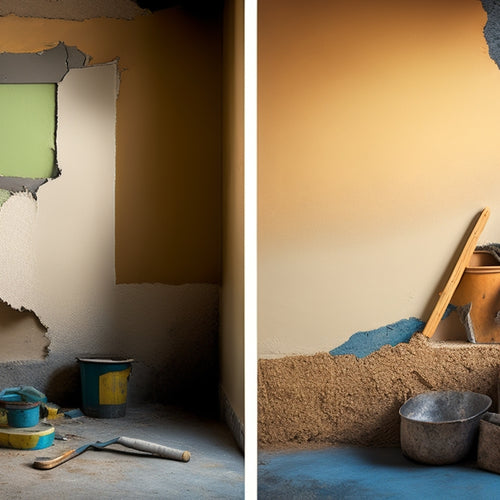
Crucial Equipment for Home Renovation Success
Share
You'll need a range of essential equipment to guarantee your home renovation project runs smoothly and successfully. Start by investing in personal protective equipment like hard hats, safety glasses, and steel-toed boots to keep you safe on site. Next, gather the necessary tools for concrete work, measuring and testing, and demolition, including concrete mixers, tape measures, and reciprocating saws. Don't forget finishing and smoothing tools like sanders and putty knives to achieve a professional finish. Finally, consider renting heavy-duty machinery like excavators and cranes to tackle complex tasks efficiently. Now that you've got the basics covered, get ready to explore the finer details that'll take your project to the next level.
Key Takeaways
• A well-planned budget and project timeline are crucial for staying organized, avoiding delays, and making informed decisions during home renovation.
• Personal Protective Equipment (PPE) such as hard hats, safety glasses, and steel-toed boots are essential for ensuring safety on the job site.
• Specialized tools like concrete mixers, finishing trowels, and edging tools are necessary for achieving professional-looking results in concrete work.
• Measuring and testing devices like tape measures, laser levels, and digital multimeters are vital for accurate measurements and identifying hazards.
• Power tools like reciprocating saws, demolition hammers, and rotary hammers are necessary for efficient demolition, but proper techniques and maintenance are required for safety and efficiency.
Planning and Budgeting Essentials
Before you start demolishing walls or picking out tile, you need to define your renovation goals, assess your current space, and establish a realistic budget to confirm your project stays on track.
This vital planning phase will help you create a clear project timeline, which is essential for staying organized and avoiding costly delays.
To create an accurate timeline, break down your project into smaller tasks and estimate the time required for each one.
Next, you'll need to create a detailed cost estimation to guarantee you have enough funds to complete your project.
Consider factors like labor costs, materials, and permits when calculating your total budget.
A well-planned budget will help you make informed decisions and avoid financial stress during the renovation process.
Essential Tools for Concrete Work
With concrete work playing a crucial role in your home renovation project, you'll need a set of essential tools to get the job done efficiently and effectively.
Concrete mixers, for instance, are a must-have for mixing and blending cement, sand, and water to achieve the perfect consistency.
You'll also need a range of finishing trowels in various sizes and shapes to smooth out the concrete surface, remove excess water, and create the desired texture.
Additionally, you'll require edging tools to create clean edges and joints, as well as a level to guarantee the concrete is poured to the correct height and angle.
A concrete screed or straightedge is also necessary for smoothing and flattening the surface.
Don't forget a set of knee pads and a rubber float to protect your knees and achieve a smooth finish.
Safety Gear and Protective Equipment
When you're about to start a home renovation project, you're not just preparing for the task at hand; you're also preparing to protect yourself from potential hazards.
You'll need the right safety gear and protective equipment to guarantee your well-being, and that's where we come in - to guide you through the must-haves.
From hard hats to respiratory safety checks, you'll learn what you need to prioritize your safety on the job.
Hard Hat Essentials
You'll need a few essential pieces of safety gear to secure your protection on the job site, starting with a hard hat that meets the American National Standards Institute (ANSI) Z89.1 standard. This is vital, as hard hat regulations require you to wear a hat that's been tested and certified to protect against falling objects, electrical hazards, and other job site dangers.
To guarantee your hard hat remains effective, you'll need to perform regular hard hat maintenance. Here's a quick checklist:
| Task | Frequency | Why |
| Inspect the hat for damage | Daily | Identify cracks, dents, or other damage that could compromise safety |
| Clean the hat | Weekly | Remove dirt, dust, and debris that can hide damage or compromise the hat's effectiveness |
| Store the hat properly | After each use | Prevent damage from storage or transportation |
Eye Protection Options
Protect your eyes from flying debris, chemicals, and other hazards with safety glasses or goggles that meet the ANSI Z87.1 standard, as eye injuries can be devastating and even permanent.
You'll find various types of safety glasses, each designed for specific tasks. For general protection, opt for general-purpose safety glasses with impact-resistant lenses and frames.
If you're working with chemicals or in high-dust environments, consider goggles with a seal around the eyes to prevent exposure. Prescription safety glasses are also available, ensuring you can see clearly while staying safe.
Don't forget about specialized goggles for tasks like welding or cutting, which require enhanced protection from intense light and heat.
When selecting eye protection, make sure it fits comfortably and securely, allowing you to focus on the task at hand.
Respiratory Safety Checks
Breathe easy by guaranteeing your respiratory safety gear is up to par, as airborne contaminants can cause serious health problems if inhaled.
You'll want to inspect your masks, respirators, and filters regularly to guarantee they're functioning properly. Don't forget to check the expiration dates of your filters and replace them as needed. When working with hazardous materials, it's essential to wear a respirator that's designed for the specific task at hand.
Indoor air quality is a significant concern during home renovations. Dust, chemicals, and other airborne particles can quickly accumulate and create unhealthy conditions.
Make sure your ventilation systems are working efficiently to remove contaminants from the air. Open windows and doors whenever possible, and consider using air purifiers or fans to improve circulation.
Measuring and Testing Devices
Measure accurately with the right tools, as incorrect measurements can lead to costly mistakes and delays in your home renovation project. You'll need reliable measuring and testing devices to guarantee precision and accuracy.
Invest in a high-quality tape measure that can withstand harsh job site conditions. Look for one with a sturdy hook, clear markings, and a comfortable grip. A laser level is another essential tool that helps you achieve precise horizontal and vertical alignments. It's perfect for hanging cabinets, installing shelves, and laying tiles.
Additionally, consider a digital multimeter for electrical testing and a stud finder to locate hidden studs behind walls. These tools will help you identify potential hazards and avoid costly mistakes.
Don't forget a level and a plumb line to guarantee your walls and floors are straight and level. With these measuring and testing devices, you'll be able to tackle your home renovation project with confidence, accuracy, and safety.
Power Tools for Demolition
What's the most efficient way to tear down walls, rip up flooring, and smash through cabinets without exhausting yourself or causing unnecessary damage to surrounding structures? The answer lies in having the right power tools for demolition. With the correct tools, you'll be able to tackle even the toughest demolition tasks with ease and precision.
Here are some essential power tools for demolition:
| Tool | Description | Demolition Technique |
|---|---|---|
| Reciprocating Saw | Ideal for cutting through wood, metal, and drywall | Ripping out cabinets and countertops |
| Demolition Hammer | Powerful tool for breaking up concrete, tile, and stone | Smashing through flooring and walls |
| Rotary Hammer | Versatile tool for drilling and chiseling | Removing tile, mortar, and concrete |
Remember to always follow proper demolition techniques and maintain your power tools regularly to guarantee safety and efficiency. Regular power tool maintenance will help prevent accidents and prolong the life of your tools. By having the right tools and knowing how to use them, you'll be able to complete your demolition tasks quickly and safely.
Finishing and Smoothing Tools
With your demolition work complete, you're now ready to shift your focus to the finer details, and that's where finishing and smoothing tools come into play, helping you to achieve a professional-looking finish.
These tools are essential for refining your renovation project, ensuring a smooth and even surface for painting, staining, or applying other finishing materials.
Mastering sanding techniques is vital for a flawless finish. You'll need a range of sanders, including belt sanders, orbital sanders, and detail sanders, to tackle different surfaces and tasks.
Don't forget to invest in various grits of sandpaper to accommodate different stages of the sanding process.
Additionally, you'll require other finishing and smoothing tools, such as putty knives, scrapers, and rasps, to fill gaps, remove old adhesives, and smooth out rough edges.
When working with these tools, remember to prioritize safety by wearing protective gear, including gloves, safety glasses, and a dust mask.
Heavy-Duty Machinery Rentals
When it comes to heavy-duty machinery rentals, you'll need to take into account a few key factors to guarantee your home renovation project runs smoothly.
You'll have to decide whether renting or buying is the best option for you, and which types of machinery are necessary for your specific project.
Renting Vs. Buying
You'll likely need heavy-duty machinery for your home renovation project, but before investing in expensive equipment, consider the cost-benefit analysis of renting versus buying. A thorough cost analysis will help you decide which option is more financially viable for your project.
Renting heavy-duty machinery offers several benefits, including reduced upfront costs, lower maintenance expenses, and access to specialized equipment you may only need for a short period. Additionally, rental companies often provide operator training, which can be a significant safety advantage.
When you rent, you won't have to worry about equipment storage or disposal when the project is complete. Moreover, rental companies typically handle equipment maintenance and repairs, freeing up your time and resources for other aspects of the project.
Machinery Variety Matters
Having access to a diverse range of heavy-duty machinery rentals can greatly impact the efficiency and success of your home renovation project. You'll be able to tackle various tasks with ease, from excavation techniques to demolition and construction.
| Machinery Type | Benefits |
|---|---|
| Excavators | Perform complex excavation techniques with precision and speed |
| Cranes | Lift heavy materials and equipment with ease, saving time and labor |
| Dump Trucks | Transport large quantities of materials and debris efficiently |
With a variety of machinery rentals at your disposal, you'll be able to adapt to changing project requirements and overcome unexpected challenges. Additionally, renting equipment eliminates the need for equipment maintenance, allowing you to focus on the project itself. By choosing the right machinery for the job, you'll be able to complete tasks more efficiently, reducing the overall project timeline and costs. By doing so, you'll be able to achieve your home renovation goals without compromising on quality or safety.
Safety First Always
As you select the right heavy-duty machinery rentals for your home renovation project, prioritize safety above all else, recognizing that proper equipment operation and maintenance are vital to preventing accidents and guaranteeing a successful outcome.
Don't assume that accidents won't happen to you - they can, and they do. That's why it's important to take proactive measures to minimize risks. Start by making sure you have the necessary personal protective equipment (PPE) such as hard hats, safety glasses, and steel-toed boots.
Additionally, invest time in emergency preparedness by creating a first aid kit and having a plan in place in case of an accident. Know what to do in case of an emergency, and have a communication plan in place.
It's also important to regularly inspect and maintain your equipment to prevent mechanical failures. By prioritizing safety, you'll not only protect yourself and your team but also avoid costly delays and guarantee a successful renovation project.
Frequently Asked Questions
Can I Renovate My Home Without Professional Help?
You're wondering if you can renovate your home without professional help? It's possible, but be aware that DIY renovation tips can only take you so far.
Home improvement challenges like electrical and plumbing work require expertise to avoid safety hazards. If you're not experienced, it's better to hire a pro to guarantee your safety and the integrity of your home.
How Do I Dispose of Construction Waste Legally?
You're about to drown in a sea of construction waste if you don't get your disposal act together!
Don't risk fines and environmental harm - do it legally!
Start by contacting your local waste management agency to learn about recycling options and designated dump sites.
Segregate materials, like wood and drywall, and consider hiring a waste removal service if you're not equipped to handle it yourself.
Stay safe, and stay compliant!
What Are the Building Codes in My Area?
You're wise to wonder what building codes are in your area! Knowing local regulations is key to a successful renovation.
Start by visiting your local government's website or contacting your building department to get the lowdown. They'll guide you through the process and let you know what's required for building inspections.
Don't risk costly rework or even safety hazards - get informed and compliant from the get-go!
Can I Reuse Old Materials in My Renovation?
You've probably heard the saying 'reduce, reuse, recycle' - but can you really reuse old materials in your renovation?
Think of it like giving an old friend a makeover. You can upcycle materials like reclaimed wood and salvage fixtures to save money and reduce waste.
Just verify they meet current building codes and are safe to use.
Inspect each item carefully, and don't be afraid to let go if it's no longer functional or safe.
Do I Need a Permit for Electrical Work?
You're wise to ask about permits for electrical work. Electrical safety is no joke, and permits guarantee you're meeting local codes.
You'll typically need a permit for major electrical projects, like installing new circuits or rewiring. There are different permit types, such as electrical permits or building permits, so check with your local authorities to determine what's required.
Don't risk your safety or invalidating your insurance – get the proper permits before starting your electrical work.
Conclusion
As you wrap up your home renovation, remember that having the right gear isn't just about getting the job done - it's about doing it with finesse.
With the right equipment, you'll avoid the costly detours and frustrating setbacks that can turn your dream project into a nightmare.
By investing in these essential tools, you'll be the master of your domain, effortlessly steering through the twists and turns of renovation and emerging victorious on the other side.
Related Posts
-

Top Tools for DIY Home Renovation Plastering Success
To achieve DIY home renovation plastering success, you'll need a range of essential tools. Start with hand tools like...
-

7 Best Home Renovation Project Checklists With Timelines
You're about to initiate a home renovation project, and establishing a clear plan with timelines is vital to staying ...
-

Top 3 Tools to Buy for Stucco Renovation
You'll need the right tools to guarantee a successful stucco renovation, and it all starts with three essential items...


